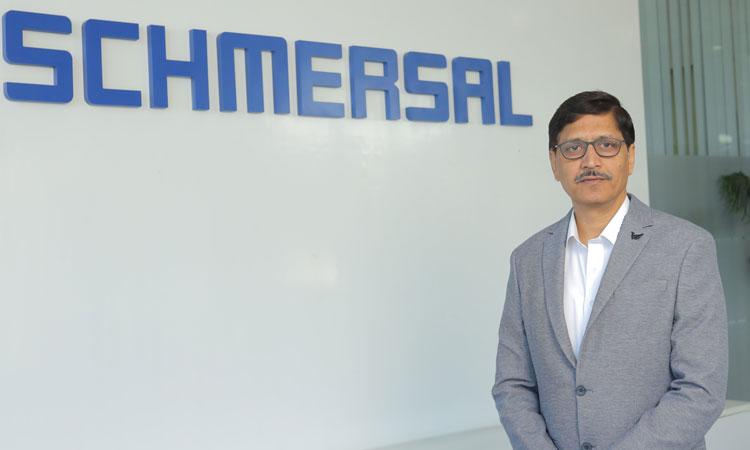With over three decades of manufacturing experience, Dnyaneshwar Pangarkar, Production Head at Schmersal India, has emerged as a key driver of operational excellence in machine safety. His journey reflects the power of lean thinking, strategic agility, and a people-first approach in transforming challenges into achievements.
Q) Can you share your journey in the manufacturing industry and how it led you to your current role at SCHMERSAL?
My career started in 1994 at NRB Bearings Ltd as a Planning Engineer. I’m deeply grateful to NRB for the learning opportunities and freedom that helped me grow in roles spanning production planning, costing, project management, and strategic operations.
Over 30 years, I contributed to ERP implementations like Oracle Apps at NRB and SAP at TACO and Schmersal. I worked with Japanese lean experts and led greenfield projects, all of which shaped my ability to drive performance through process improvement. At Schmersal India, I blend Japanese continuous improvement with German innovation—this synergy defines my approach as Production Head.
Q) SCHMERSAL is known for its high-quality safety systems. What role does the production team play in maintaining this quality benchmark?
Our tagline “DNA of Safety” reflects our mindset. We begin every day with a Gemba meeting to align on quality, safety, and operational metrics. Our production team is pivotal—we’ve implemented clear SOPs to ensure operator safety, machine efficiency, and consistent output.
At Schmersal, quality comes first. We’ve built a culture that emphasizes learning and precision. Our team is trained to prioritize quality over quantity, and as a result, quantity naturally follows.
Q) What innovations or improvements have you led that you’re particularly proud of?
Since we handle highly customized safety components, we often deal with one-piece orders. Managing high product variants with strict delivery timelines is a challenge. We addressed this by implementing SAP MRP, adopting lean manufacturing, and enabling quick changeovers. Today, we can dispatch even same-day orders.
One of my proudest achievements is the implementation of POKAYOKE (error-proofing) across nearly every manual assembly process. This has led to zero rejections in production-related quality over the past 11 years—a significant feat in a manual-intensive setup.
Q) How do you balance productivity with sustainability and safety on the shop floor?
We never see safety or sustainability as barriers—they’re integral to our production design. By embedding safety into the early stages of process planning and following lean principles, we ensure efficiency without compromise.
We also focus on environmental responsibility. We’ve installed solar panels to reduce our carbon footprint and actively monitor energy consumption. Employees are empowered to flag potential hazards, making safety everyone’s responsibility.
Q) What qualities do you look for when building your production team?
Attitude is key. During our initial setup at Schmersal India, we hired fresh ITI graduates and trainee supervisors—none had prior manufacturing experience. Through well-defined SOPs, classroom sessions, and on-the-job training, we built a competent team from the ground up.
Beyond technical training, we offer overseas exposure, customer site visits, and soft skills development. These experiences help our team understand the broader impact of their work and cultivate a problem-solving mindset.
Q) What has been one of your most challenging projects, and how did you overcome it?
The most challenging project was launching Schmersal India’s production plant. I was the only person sent to Germany for hands-on training. With limited experience outside the automotive domain, I had to adapt quickly.
I developed a detailed project plan covering layout design, hiring, training, and equipment setup. We trained inexperienced operators, built lean-friendly assembly lines, and created store layouts. Despite multiple challenges, our team successfully launched production on time, proving the power of careful planning and teamwork.
Q) How is SCHMERSAL embracing Industry 4.0 and smart manufacturing?
We’ve integrated smart manufacturing through IoT connectivity in our injection moulding machines, giving us real-time data on CP, CPK, OEE, and predictive maintenance. This improves machine utilization and preemptive decision-making.
Our supply chain is fully digitized—warehouse operations use barcode scanners, and production/inspection data is recorded digitally. We’ve also implemented an energy management system that tracks daily consumption and alerts us to anomalies. These advancements enhance efficiency, safety, and sustainability.
Q) What are your thoughts on the future of production in India, especially around automation and digitalization?
With government initiatives like Make in India and PLI schemes, India is witnessing a manufacturing resurgence. Automation and digitalization are transforming how we operate—bringing real-time visibility, actionable insights, and empowering even junior staff to make data-driven decisions.
Rather than replacing people, these technologies enhance productivity and decision-making across all levels. India’s future lies in its ability to fuse technology with skilled human capital.
Q) In your opinion, what makes a great Production Head in today’s industrial landscape?
A great Production Head must be agile, people-oriented, and process-driven. Beyond technical expertise, leadership today is about empowering teams, fostering innovation, and driving continuous improvement.
At Schmersal, we don’t just produce safety systems—we build a culture of safety. That requires leading from the front, nurturing talent, and aligning operations with long-term strategic goals. It’s this balance of people and process that creates sustainable manufacturing excellence.



